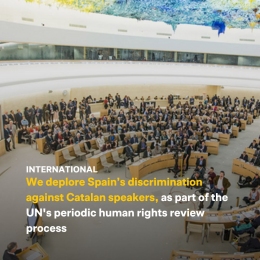As part of the UN Human Rights Council's Universal Periodic Review, Plataforma per la Llengua has presented a report listing the violations of Catalan speakers' language rights in Spain. The organisation notes that Spain has even failed to comply with the recommendations it undertook to apply following the last review, and makes seven recommendations other States could pass on to Spain in the current review. The UPR is a mechanism under which, every four and a half years, UN States assess each other to analyse their level of respect for human rights.
In particular, Plataforma per la Llengua recommends that Spain should take measures to punish language discrimination perpetrated by public servants and include the Catalan-speaking minority as a protected group in the signing of the Council of Europe's Framework Convention for the Protection of National Minorities. It also recommends that Spain should approve legislation to recognise the rights of speakers of official languages other than Spanish so that these can be used with State administrative workers and in the judicial system, and that it should comply with the recommendations of the European Charter for Regional or Minority Languages (ECRML) and the UN special rapporteur for minorities. In particular, it calls for Article 231 of the Judiciary Act to be amended, as it establishes that officials must use Spanish in judicial proceedings and that "co-official minority languages" will be allowed only if no party to the proceedings opposes this. Plataforma per la Llengua also recommends that the State should take measures to ensure children can be educated in Catalan and to investigate, prosecute and punish hate speech against Catalan speakers and the Catalan language on the Internet and in other media.
.jpg)
In this report, the organisation also recalls that the Spanish State favours Spanish and relegates Catalan in the rules for obtaining public subsidies, that Catalan speakers perceive the Spanish justice system as hostile, and that maintaining language immersion in schools is necessary so that children from Spanish-speaking backgrounds can learn Catalan well. Plataforma per la Llengua has also analysed the requirements for public servants in the general State administration assigned to Catalan-speaking territories and has found that no level of Catalan is required in any workplace, and that a certain level of Catalan is only valued as a merit for 2.16% of posts in Catalonia, 1.75% of those in the Balearic Islands and 2.05% of those in the Valencian region.
Finally, the report of the pro-Catalan language organisation also deplores the fact that Spain has not heeded the recommendations made by other States which it undertook to apply concerning language rights: to eliminate all forms of discrimination and combat hate speech, xenophobia and racial discrimination; to strengthen measures to combat discrimination against language minorities; to adopt a comprehensive law against hate crimes, with assistance, protection and compensation for victims; and to develop laws and policies to punish and prevent hate crimes and discrimination, and to promote respect for diversity.
The UN Human Rights Council's Universal Periodic Review (UPR)
The Universal Periodic Review (UPR) is a mechanism of the United Nations Human Rights Council under which each UN member State is asked to undergo a peer review every four and a half years to assess how it guarantees human rights. The UPR allows each State to report on actions it has taken to improve the situation and receive recommendations from other States based on input from different stakeholders and previous reports.
The mechanism was established in 2006 and, since the first review in 2008, UN States have been reviewed three times. Plataforma per la Llengua took part in the last review and drew up a 20-page report that helped other States make their recommendations to Spain.




